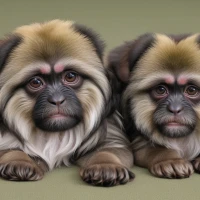Chasing Tails: Shih Tzu Chihuahua Mix Diet and Nutrition
I swear, every time I see a Shih Tzu Chihuahua mix, my heart melts a little. 🐾 These little balls of fluff have a special place in my soul. My best friend’s dog, Coco, is the most adorable Shih Tzu Chihuahua mix, and let me tell you, she’s the pickiest eater I’ve ever met! But being a veterinary expert, I couldn’t let Coco munch on anything less than the best. So, if you’re in the same boat, here’s what I’ve come to learn about feeding these charming little creatures properly.
The Essentials: Understanding Their Unique Needs
First things first, you gotta know that a Shih Tzu Chihuahua mix, often called a ShiChi, is a bundle of both breeds’ characteristics. This small dog can weigh between 5 to 18 pounds and has varied energy levels. Their diet should be tailored to meet their specific needs—considering their activity, size, and potential health issues.
Small But Mighty: Caloric Needs
Crazy fact for ya—did you know small dogs actually burn calories faster than large dogs? Yup, it’s true! ShiChis, despite their size, need a fairly high-calorie diet to match their energy levels. On average, they need about 40 calories per pound of body weight per day. This can fluctuate depending on how active or lazy your fluff ball is.
Protein: The Building Block
Protein is a big deal. It’s essential for muscle development and overall health. I’d recommend a diet containing around 22-25% protein. Look for high-quality sources like chicken, beef, fish, or lamb. Coco’s favorite is chicken – can’t get her to eat anything else without a protest!
Fats: For That Shiny Coat and Energy
Ever noticed how some dogs have the most lustrous coats? That’s thanks to their fat intake. ShiChis need fats in their diet, around 8-12%. It’s crucial for maintaining their skin and coat health and also contributes to energy levels. Omega-3 and Omega-6 fatty acids, found in fish oils or flaxseed, are particularly beneficial.
Carbohydrates: To Keep Them Going
While too many carbs can lead to weight gain, they’re a necessary evil, so to speak. About 30-50% of their diet can be carbs, but focus on good sources like sweet potatoes, brown rice, or barley. Avoid fillers like corn or soy—they don’t offer much nutritional value.
Vitamins and Minerals: The Little Things That Matter
It’s those little things that count, right? Vitamins and minerals are vital for your pet’s development. A balanced, commercial diet usually covers these needs, but sometimes supplementation is necessary. Vitamins A, D, E, and minerals like calcium and phosphorus are particularly important.
Hydration: The Overlooked Essential
Water is life, literally! Always ensure your ShiChi has access to fresh water. This lil’ fella may not show dehydration symptoms until it’s severe, so keep that bowl topped up.
Treats and Chews: Because We All Need Rewards!
Confession time: I spoil Coco with treats. But hey, who can resist those puppy eyes? Just keep treats to 10% of their daily caloric intake to avoid overfeeding. Opt for healthy snacks like carrot sticks, apple slices, or specially-formulated dog treats.
Home-Cooked vs. Commercial Food
I’ve often debated whether it’s better to cook for Coco or stick with high-quality commercial food. Both have their pros and cons. Home-cooked meals give you control over ingredients but require careful balancing to meet all nutritional needs. On the other hand, premium commercial foods are convenient and formulated to be nutritionally complete.
Special Dietary Considerations
Some ShiChis might have unique dietary needs due to health conditions. For example, if they have diabetes or kidney issues, you’d need to follow veterinary advice closely. Coco once had a bout of stomach upset, and we had to switch to a hypoallergenic diet for a while. It was a struggle, but seeing her healthier was worth it.
Raw Diets: Trendy but Risky?
Many pet owners swear by raw diets, claiming it’s more ‘natural’ for their dogs. However, raw diets can bring risks like bacterial contamination. If you’re considering this, please consult your vet for a balanced approach.
Common Mistakes and How to Avoid Them
Feeding your ShiChi table scraps or overindulging them in treats can quickly lead to obesity and other health problems. Educate everyone in your household about the feeding regimen—consistency is key!
Reading Food Labels: The Vet’s Secret
One of the best tips I can offer is to get good at reading food labels. Pick products with identifiable meat sources and avoid those with too many fillers or artificial additives. Coco’s kibble has “chicken meal” as the first ingredient – that’s what you should aim for!
Exercise and Its Role in Diet
Diet isn’t everything; exercise plays a vital role too! These dogs need regular physical activity to burn off calories and keep them in shape. Coco loves her daily walks—they also help in keeping her digestive system active.
Age-Specific Diets: Puppy vs. Adult vs. Senior
Much like humans, dogs’ dietary needs change as they age. Puppies require more protein and fat for growth, whereas adult ShiChis need a balanced diet to maintain their health. Seniors might need fewer calories but more fiber to aid digestion.
Consulting Your Vet: Because Every Dog Is Unique
Your vet is your best friend when it comes to deciding the right diet for your ShiChi. Regular check-ups can help in tweaking the diet to better suit your dog’s changing needs.
Practical Tips for Feeding Time
Make feeding time a routine. Set specific times and stick to them. Whether you’re feeding dry kibble, wet food, or a combination, ensure the portion sizes are appropriate. Coco’s feeding time is like clockwork—she even knows when it’s time!
Supplements: Do They Really Need Them?
Sometimes, diet alone isn’t enough. Supplements like glucosamine for joint health or probiotics for digestive health can make a huge difference. But again, always consult your vet before introducing any new supplement.
DIY Treat Recipes: Spoil Them Rotten!
Want to spoil your ShiChi the right way? DIY dog treats are the way to go. One of Coco’s favorites is peanut butter and pumpkin cookies. They’re simple to make and healthy too!
Environmental Impacts: Sustainability in Pet Food
An interesting tidbit—did you know that some pet food companies are moving towards sustainable practices? It’s not just about feeding your pup but also about leaving a smaller carbon paw print. Keep an eye out for brands that prioritize sustainability.
Mental Health: Food for the Mind
Believe it or not, a balanced diet can also affect your dog’s mental well-being. Nutrients like DHA are crucial for brain health. Coco’s more alert and playful when she gets the right nutrients.
Alternative Proteins: Are They Worth It?
Ever heard of insect-based dog food? While it might sound gross to us, it’s a sustainable protein source that some dogs love. Don’t knock it till you try it!
The Emotional Connection
Feeding is more than just nutrition. It’s a bonding experience. Every bite Coco takes is filled with love and care, and that makes all the difference.
Random Fact!
Did you know the world’s oldest dog lived to be 29 years old? Nutrition played a huge part in that!
Making Adjustments
If you notice any changes in weight, energy levels, or overall health, don’t hesitate to adjust their diet. Sometimes even minor tweaks can have significant benefits.
Wrapping Up
In closing, feeding your Shih Tzu Chihuahua mix isn’t rocket science, but it does require attention to detail. Put in the effort, consult your vet, and you’ll have a healthy, happy pup. Thanks for sticking around and reading this! Keep those tails wagging!
“Bone appetit!”










